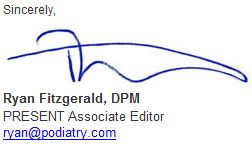 Ryan Fitzgerald, DPM
Ryan Fitzgerald, DPM
PRESENT RI Associate Editor
Hess Orthopedics &
Sports Medicine,
Harrisonburg, Virginia
|
|
Case Presentation:
Peroneal Tendon Repair Utilizing a Novel Bioengineered Alternative Tissue
HPI: The patient is a 52 year old male who presents with chronic pain in his left lateral ankle and foot following an injury he sustained at work while jumping from the back of a pick-up truck. He presents complaining of pain with motion and with weight bearing, and he relates a feeling of instability. His pain has gradually gotten worse over time and he relates that he has previously attempted physical therapy and functional bracing—both of which have failed to yield results without pain. He presents today seeking a surgical solution for this problem.
PMH: HTN, dyslipidemia, osteoarthritis
PSH: Right ankle ORIF, Wisdom tooth extraction, CTR, Left Shoulder arthroscopy
FMH: Noncontributory
MEDS: Cozaar, Effexor XR, multivitamin, calcium with Vitamin D
ALL: NKDA
SOCIAL: The patient denies current tobacco usage but states he has previously used chewing tobacco, but that he quit several years previously
ROS:The patient denies any other complaints apart from the above complaint. He denies any recent history of fevers, chills, nausea, vomiting, or any other constitutional symptoms.
VS: BP: 132/84, HR: 82, RR: 18, Temp: 98.1
PE: The patient is awake, alert, and oriented, and in no apparent distress. He presents with palpable pedal pulses that are graded +2/4 at the dorsalis pedis and posterior tibial arteries. There are not varicosities or telangectasias noted in the lower extremity, and the capillary filling time is less than 3 seconds. The patient demonstrates muscle strength that is graded +5/5 in dorsiflexion, plantarflexion, and inversion, with +4/5 in eversion with pain elicited along the distal course of the peroneal tendons along the lateral aspect of the left foot. Additionally, there is pain with direct palpation along the course of the peroneus brevis into its insertion into the base of the 5th metatarsal. There are no skin lesions noted. Protective sensation is grossly intact along the distal distribution of the L4, L5, and S1 nerve roots, and proprioception and vibratory sense are also intact.
Imaging Studies: MRI images of the left ankle were obtained which demonstrate longitudinal tearing of the peroneus brevis and longus tendons distal to the lateral malleolus along the lateral ankle. There was intra-substance degeneration and tearing noted.
Plan: Considering the failure of conservation options and the patient’s persistent pain, the decision was made to bring the patient to the operating room for operative repair of the tendon pathology demonstrated on MRI. Prior to surgical intervention, all risks, benefits and potential outcomes were discussed with the patient and the patient consented to the procedure.
Surgical Procedure: The patient was brought to the operating room and an expansitile lateral incision was utilized to provide exposure to the affected tendons (fig.1).
Debridment of all nonviable, degenerative tissue, and subsequent tubularization of the tendons
(fig. 2).
Upon tendon tubularization, InforceTM Reinforcement Matrix (Integra LifeSciences) was utilized to provide a collagen graft with significant tensile strength that was wrapped around the tendon to provide a collagen on-lay graft and to reinforce the intra-substance repair (fig. 3).
The graft was trimmed to fit and was sutured in place to the graft repair site (fig. 4).
The repair site was then injected with platelet rich plasma obtained from the patient’s peripheral blood and concentrated via the Biomet GPS III system (fig. 5)
Final repair is visualized following completion of tendon repair, graft placement, and injection of
PRP (fig. 6.).
Post-Operatvie Course: Post operatively, the patient was placed into a modified jones compression dressing and then was transitioned into a short leg, non-weight bearing cast at the first post-op visit. He was kept non-weight bearing for approximately six weeks and then was gradually transitioned to protected weight bearing in a cam-walker by eight weeks post-op. At this time physical therapy was initiated to return the patient to normal strength and function. He has now returned to full activity and demonstrates no pain or loss of function.
Discussion: When considering augmentation during primary tendon repair, it is important that the surgeon consider the appropriate characteristics of the graft in question. Grafts utilized in tendon repair frequently require significant tensile strength., However, a common trade-off for increased strength in tension is increased graft thickness, which can pose a problem. This is especially so in the lower extremity, where there is often minimal soft tissue coverage to appropriately contain thick tendon constructs. The ideal graft would provide significant tensile strength, while remaining low-profile during placement. The InforceTM Reinforcement Matrix demonstrates high biomechanical strength and provides a durable reinforcement during the healing phase of a repaired tendon. InforceTM is composed of biocompatible Type I collagen matrix, designed to provide an environment for host-tissue regeneration and integration of the implant at a controlled rate of in situ remodeling. The matrix is purified to remove non-collagenous materials that may cause inflammatory or immunological responses.
We at PRESENT love hearing from you, and look forward to learning from you. I encourage you to post your interesting cases in the eTalk section of PRESENT podiatry to promote our collective knowledge. We look forward to hearing from you!

Get a steady stream of all the NEW PRESENT Podiatry
eLearning by becoming our Facebook Fan.
Effective eLearning and a Colleague Network await you. |
 |
|